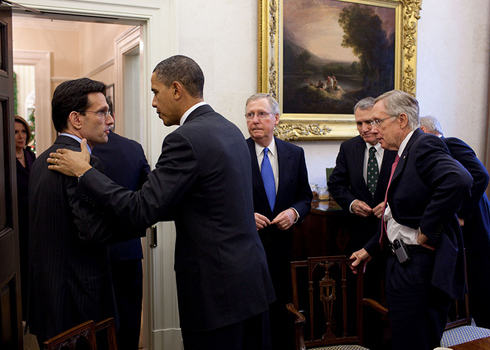Speaking of things Republicans claim credit for, they began the day Tuesday morning citing themselves as the inspiration for President Obama’s decision this week to require federal agencies to tailor rules and regulations in a more business-friendly way. The move rankled progressive advocates and briefly united Obama once again with Republicans against his liberal supporters. But his administration quickly insisted that the new rules would not constitute a dramatic change in policy — particularly with respect to big-ticket items like health care and Wall Street reform — and by Wednesday morning he was once again left with few allies.
“[The] Executive Order from President Obama shows that he heard the same message I did in the last election – that Americans are sick and tired of Washington’s excessive overreach and overspending,” said House Majority Leader Eric Cantor in a statement to reporters Tuesday, welcoming the development.
At his weekly press availability, Cantor characterized it as one example of Obama embracing the GOP’s job-creation platform. “Some of [our plan] was very much embraced along the way by this President,” he said.
But after the administration issued caveats about new health care regulations, Republicans backed off.
That left Obama without many allies.
There aren’t too many advocacy groups that seek to make the executive branch’s regulatory apparatus more progressive. But the ones that do were outraged. “President [Obama] embraces a frame for the coming discussion about the role of regulation in society that is right out of the Republican hymnal, calling for ‘balance’ between safety and economic growth, and bemoaning regulations that sometimes ‘place unreasonable burdens on business–burdens that have stifled innovation and have had a chilling effect on growth and jobs,'” reads a statement from Rena Steinzor, President of the Center for Progressive Reform. “By casting the discussion in those terms, the President swallows the GOP’s frame for the debate hook, line, and sinker.”
Robert Weissman, President of Public Citizen agrees. Obama, he said, “adopts business and right-wing think-tank talking points about the harms of regulation and urges ‘balance’ in achieving the right amount of regulation…. This is the wrong way to think about regulation, and it is the wrong direction for the American people. Markets cannot function without proper regulation. That means businesses cannot function without proper regulation. We do not need a ‘balance’ between regulation and the free market. We need effective regulations that foster the right types of markets.”
Obama outlined his order in a Tuesday Wall Street Journal op-ed.
“This order requires that federal agencies ensure that regulations protect our safety, health and environment while promoting economic growth. And it orders a government-wide review of the rules already on the books to remove outdated regulations that stifle job creation and make our economy less competitive,” Obama wrote. “It’s a review that will help bring order to regulations that have become a patchwork of overlapping rules, the result of tinkering by administrations and legislators of both parties and the influence of special interests in Washington over decades.”
The White House hasn’t ordered specific changes — only that agencies review and refine their rules and regulations. So it’s tough to say whether this is more than just a rhetorical shift. And it’s unclear what, if any, impact the decision will have on Obama’s actual governance. Deeds matter more than words, and the Obama administration still has broad authority to implement rules and regulations that please liberals. But Republicans will cite this executive order as they try to tie his hands for the next two years.






